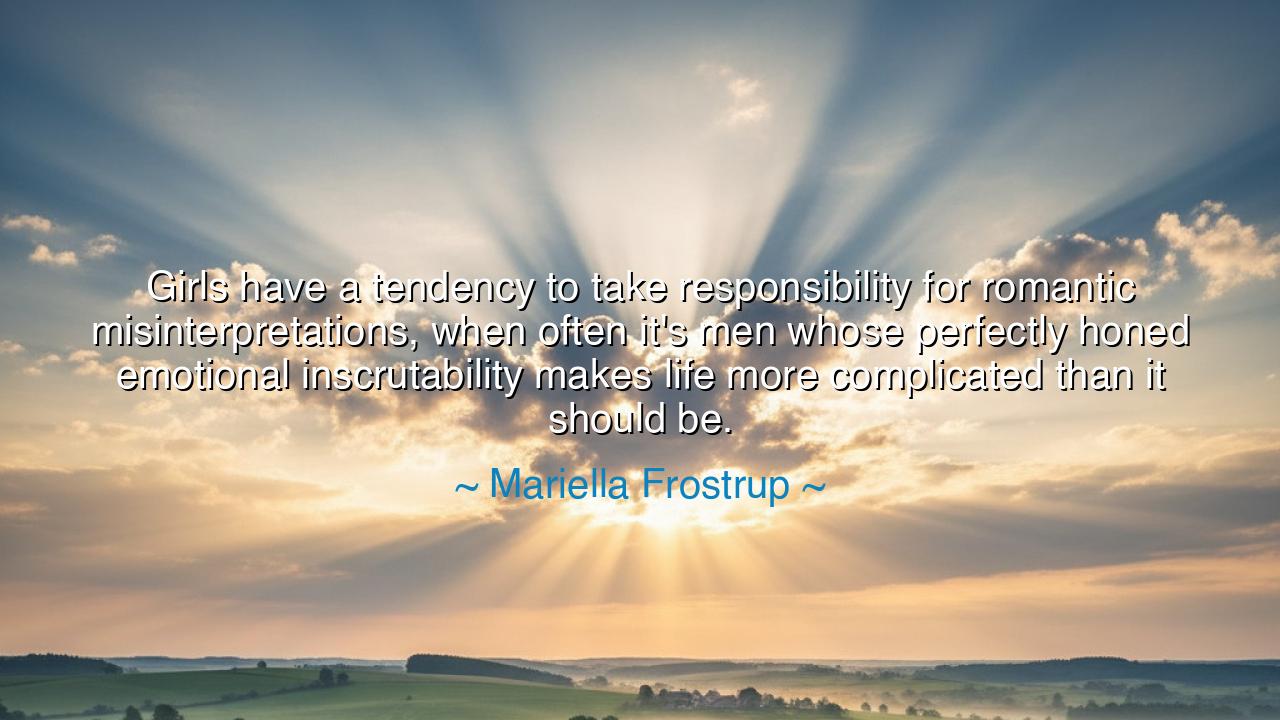
Girls have a tendency to take responsibility for romantic
Girls have a tendency to take responsibility for romantic misinterpretations, when often it's men whose perfectly honed emotional inscrutability makes life more complicated than it should be.






"Girls have a tendency to take responsibility for romantic misinterpretations, when often it's men whose perfectly honed emotional inscrutability makes life more complicated than it should be." These words from Mariella Frostrup bring to light a deep and profound truth about the dynamics of romantic relationships and the complex nature of communication between the sexes. Frostrup suggests that in many cases, women take on the burden of misunderstandings in love, often feeling as though they are responsible for the misinterpretations that arise, when in fact, it is often the emotional complexity and inscrutability of men that adds to the confusion. The very essence of romantic relationships is founded upon the delicate balance of communication, yet in many relationships, this balance is tipped by the hidden emotions and unspoken words that men sometimes carry with them.
In the ancient world, communication between men and women was often fraught with obstacles, not merely because of differing emotions, but because of the roles and expectations placed upon each gender. Sophocles, in his tragic plays, often explored the theme of unspoken truths—where fate and misunderstandings collide, creating irreparable harm to relationships. Antigone, for example, defies her king and uncle, Creon, out of a deep sense of family duty, while he, in his own stubbornness and inability to listen, condemns her. The tragedy unfolds not only because of Antigone’s actions, but because of Creon’s emotional blindness—his inscrutability in understanding her intentions leads to a tragic downfall. Much like Frostrup’s statement, the failure of communication, especially the inability to express one’s emotions clearly, leads to a complicated, and often painful, misunderstanding.
Consider the myth of Orpheus and Eurydice, where Orpheus, though deeply in love with his wife, is tasked with bringing her back from the underworld. His failure to follow the divine command not to look back is driven by his fear and lack of faith, traits that reflect his emotional inscrutability. Eurydice, on the other hand, is silent in her pain, waiting in the darkness. Their tragic end stems not only from the external forces of the gods but from the lack of communication between them. Orpheus’ inability to express his doubt and uncertainty leads to their ultimate separation. Here, Frostrup’s insight resonates: the emotional complexity and lack of transparency between the characters lead to a deep and irreversible misinterpretation of intentions, creating tragic consequences.
In modern relationships, we see similar patterns of emotional miscommunication. Women, as Frostrup notes, often bear the weight of these misunderstandings, striving to interpret and respond to vague signals or hidden emotions. Men’s reluctance to express their feelings openly, and the tendency to keep their emotions inscrutable, only adds to the tension and complexity of the relationship. The romantic comedy genre often plays on this theme—misunderstandings between partners, where one or both parties are too proud or fearful to speak openly, lead to comic, yet poignant, complications. Yet in real life, these emotional barriers are not so easily overcome, and they often lead to frustration and heartbreak.
Consider the real-life example of Pablo Neruda, the Chilean poet whose passionate love for Matilde Urrutia became the subject of his most famous works. Neruda’s poetry, filled with longing and desire, often expressed the depth of his emotional world, but his personal life was far more complicated. He struggled with the emotional distance in his relationships, particularly with his first wife, Delia del Carril, and the tumultuous love he had for Matilde, who became his muse. Neruda’s inability to fully communicate his inner world led to painful separations and emotional isolation, demonstrating how emotional inscrutability can complicate even the most passionate of relationships. Neruda’s life, like the lives of many others, reflects the truth of Frostrup’s insight: romantic misinterpretations often stem not from the actions of one partner, but from the emotional distance created by one partner’s inability to communicate openly.
The lesson we can learn from Frostrup’s reflection is one of self-awareness and honesty in relationships. To overcome the complications of romantic misinterpretation, both partners must embrace the courage to express their emotions clearly and without fear. In the ancient stories, the heroes and heroines often falter not because of their love, but because of their inability to speak their truth. Whether it is Antigone defying the laws of Creon, or Orpheus’s tragic glance back at Eurydice, the lack of clear communication between lovers leads to their undoing. In our own lives, we must strive to be honest, open, and vulnerable, ensuring that our actions and words align with our true intentions.
So, in your own life, when faced with romantic complexities or misunderstandings, take the time to open your heart and speak your truth. Avoid letting the silent gaps between you and your partner widen, for in these gaps, misunderstandings and misinterpretations breed. Practice clarity and vulnerability, and encourage your partner to do the same. Like the ancient heroes who faced their emotional conflicts, let your love be one built on communication, for it is through honesty that true understanding and peace can be found.






AAdministratorAdministrator
Welcome, honored guests. Please leave a comment, we will respond soon